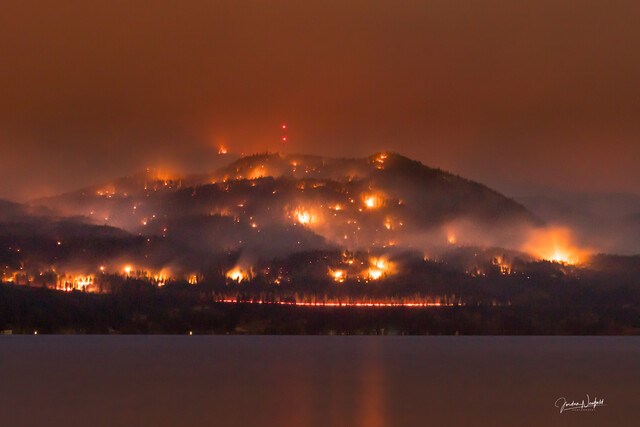The B.C. forestry sector has been fighting wildfires since early July, according to both industry and the BC Wildfire Service (BCWS), despite what a leaked document circulating online suggests.
The provincial government is responding to leaked meeting minutes, detailing a call on July 12 between BCWS and several forestry companies that suggests B.C. was in desperate need of resources to fight fires at the time.
“Need every available resource. All BCWS people are working,” said the minutes, which first surfaced in an independent documentary on those who disobeyed evacuation orders in Paxton Valley to fight the White Rock Lake fire.
“Will rent fire equipment from industry if you are now using it,” the minutes continue. “Very limited air support available.”
At the meeting, BCWS discussed with forestry companies that there were no additional resources available in neighbouring jurisdictions due to severe fire seasons elsewhere, so industry help was needed.
What isn’t mentioned in the meeting minutes — which have sparked outrage among those who allege bureaucracy is strangling the wildfire service — is forestry companies had already been actively fighting fires at least a week at that time.
BCWS director of fire centre operations Rob Schweitzer told Castanet Thursday the meeting was a routine one held every few months between the province and forest industry. He said he told industry at the meeting that provincial resources would be focused on protecting communities and infrastructure, and B.C. could use help fighting backcountry blazes impacting timber.
Schweitzer said forestry companies had been fighting fires since the “beginning of July.” That is corroborated by Tolko, which told Castanet Wednesday night they have been actively fighting fires since July 5.
“I'm happy to say is this group of either major licensees or independent contractors across the province, have literally stopped their operations for the last six, seven weeks, and have come to support the wildfire effort both in the backcountry, as well as in and around the communities that they live and work,” Schweitzer said, adding some companies have lost equipment on the fire lines.
Since the Chapman review of the 2017 fire season, Schweitzer said BCWS has relied heavily on forestry companies to fight fires, particularly in the early stages of a wildfire when industry will attempt to hold the blaze prior to provincial resources arriving.
Schweitzer said logging companies manage those fires under “limited supervision,” which means “having our staff coming out there from time to time, just helping provide the objectives, making sure everything is being done safely.”
Schweitzer also pushed aside suggestions that the meeting minutes from July 12, which were generated by a forestry group, meant outside resources should have been requested sooner. The request for federal assistance went out on July 5, he said, and discussions were underway internally for a provincial state of emergency that would eventually be declared on July 20.
“What we felt leading up to the decision by government to actually declare [the state of emergency] was we were getting access to all available resources. The state of emergency wasn't going to give us any necessarily increase or benefit because of the partnerships that we had already formed with the forest industry, with fire departments and local governments across the province and with the federal government in getting that military assistance. So we were satisfied that we were seeing those resources coming, the resources that were available,” Schweitzer said.
Forestry companies free to fight fires
The White Rock Lake wildfire was discovered on July 13, the day after the meeting between Schweitzer and the forest industry. There have been allegations that BCWS told forest crews and ranchers to stand down and not fight the fire at its outbreak. Schweitzer said that is simply not true, and nobody was ever told to stand down.
“And in fact, as we've seen throughout this season, myself personally has worked with the cattlemen to actually lean on and utilize the ranching community for their local knowledge, their local equipment to actually assist us in some of the wildfires, the same thing with the forest industry,” he said.
BCWS has previously said their initial attack team was on site 30 minutes after the fire was started.
Schweitzer explained that forestry companies do not need to get approval from the provincial government to fight a new wildfire start, and in fact, they are legally required to attempt to suppress any new starts within one kilometre of their logging operations.
Tolko told Castanet this week their crews have been involved in fighting the White Rock Lake, Sugar, Morgan, Mabel, McKinley, Big Stick, Deka and Canim fires.
“Along with coordinating activities for contractors and providing services like danger tree assessments, Woodlands staff have provided equipment like dozers, excavators, bunchers, and skidders,” Tolko said in a statement.
In a separate statement, the BC Council of Forest Industries said its members have been working closely with the government to suppress fires.
Schweitzer, meanwhile, is asking residents in fire-ravaged regions to look out for each other.
"There has been a lot of impact, the fire season’s not over, and really we do want to see that level of empathy across the province for one another and our crews that are doing their best on the fire line.”



